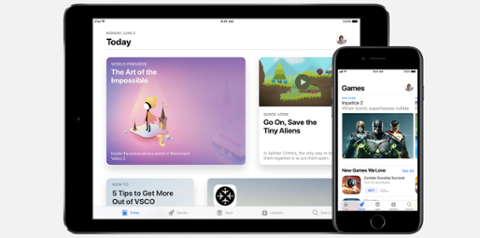[caption id="attachment_139435" align="aligncenter" width="2962"]

iOS Developer slide at WWDC 2016.[/caption] (
Update: This article has been updated with new details regarding the review and response process for the App Store.) While the newest beta release of iOS 10.3 has a lot of bells and whistles for users, there’s a critical component (or twelve) for developers: you’ll soon be able to interact with users in the reviews section. In the iOS 10.3 beta, Apple has added the ability to solicit reviews for apps without ever leaving the app proper to migrate to the App Store. Which means that, when your app pings users to leave feedback, it’ll do so natively without forcing users to go elsewhere. This feature will make its way to the macOS App Store, as well. Once a user leaves a review, developers will be able to interact with that feedback. In a nutshell, Apple is turning the ‘reviews’ section of your app into a forum, where responses are threaded under the original review. (Developer-wise, this all comes via the
SKStoreReviewController API available in
StoreKit.) Still, there's little possibility for an ongoing discussion: developers will still need their own, separate channel to support and troubleshoot user complaints. As
Daring Fireball notes, a developer will only be able to prompt users for reviews three times per year, though Apple was unable to discuss whether or not an app's rating would still be removed when an update hits (but
did say it won't 'reset the clock' on how often a developer can ask for reviews when an update is pushed). Currently, any update to an app sidelines its star rating and 'current' reviews, which prompts
some developers to ping users for new reviews fairly often. If a user provides a one-star review because they don’t understand how to access a function in an app, a developer could very easily use the forum to explain the app’s navigation and politely ask the user to update the review, which is a new feature. Previously, reviews could only be deleted (and developers had no way to reach out to unhappy souls), but both users and developers can edit their in-line commentary. Reviews and responses are still one-off; neither party will be able to go beyond a single review or response. But should a redesign or slate of new features cause uproar, as VSCO
experienced when it revamped its own app last year, developers may be better off not responding to a flood of criticism. It’s easy to get defensive about something you worked so passionately on. This news should compel us to remember
that fun video of developers reading App Store reviews. Not because the reviews were often silly or downright stupid; rather, because the developers' reactions to them sometimes teetered on rage:
Utilized properly, Apple's new functionality is potentially a great sign for developers, who have asked for quite some time for the ability to respond to reviews (if only to provide a bit of correction, explanation, or encouragement to reach out to support). Reviews may also keep users honest. In the video above, PCalc creator James Thompson reads a positive review that somehow earned one star. Those stars are the first thing a potential user sees, and frame the way they approach an app. It’s entirely possible the reviewer just didn’t think to provide a better star rating, so it’s nice that developers can now ask for corrections to those reviews. At the same time, there's now a high potential for viral meltdowns via the App Store. We’re sure Apple will intervene if a developer gets a bit too angsty and rude, but snarky apps like
CARROT Weather may have a field day with the interplay between creator and audience.
 iOS Developer slide at WWDC 2016.[/caption] (Update: This article has been updated with new details regarding the review and response process for the App Store.) While the newest beta release of iOS 10.3 has a lot of bells and whistles for users, there’s a critical component (or twelve) for developers: you’ll soon be able to interact with users in the reviews section. In the iOS 10.3 beta, Apple has added the ability to solicit reviews for apps without ever leaving the app proper to migrate to the App Store. Which means that, when your app pings users to leave feedback, it’ll do so natively without forcing users to go elsewhere. This feature will make its way to the macOS App Store, as well. Once a user leaves a review, developers will be able to interact with that feedback. In a nutshell, Apple is turning the ‘reviews’ section of your app into a forum, where responses are threaded under the original review. (Developer-wise, this all comes via the
iOS Developer slide at WWDC 2016.[/caption] (Update: This article has been updated with new details regarding the review and response process for the App Store.) While the newest beta release of iOS 10.3 has a lot of bells and whistles for users, there’s a critical component (or twelve) for developers: you’ll soon be able to interact with users in the reviews section. In the iOS 10.3 beta, Apple has added the ability to solicit reviews for apps without ever leaving the app proper to migrate to the App Store. Which means that, when your app pings users to leave feedback, it’ll do so natively without forcing users to go elsewhere. This feature will make its way to the macOS App Store, as well. Once a user leaves a review, developers will be able to interact with that feedback. In a nutshell, Apple is turning the ‘reviews’ section of your app into a forum, where responses are threaded under the original review. (Developer-wise, this all comes via the 


